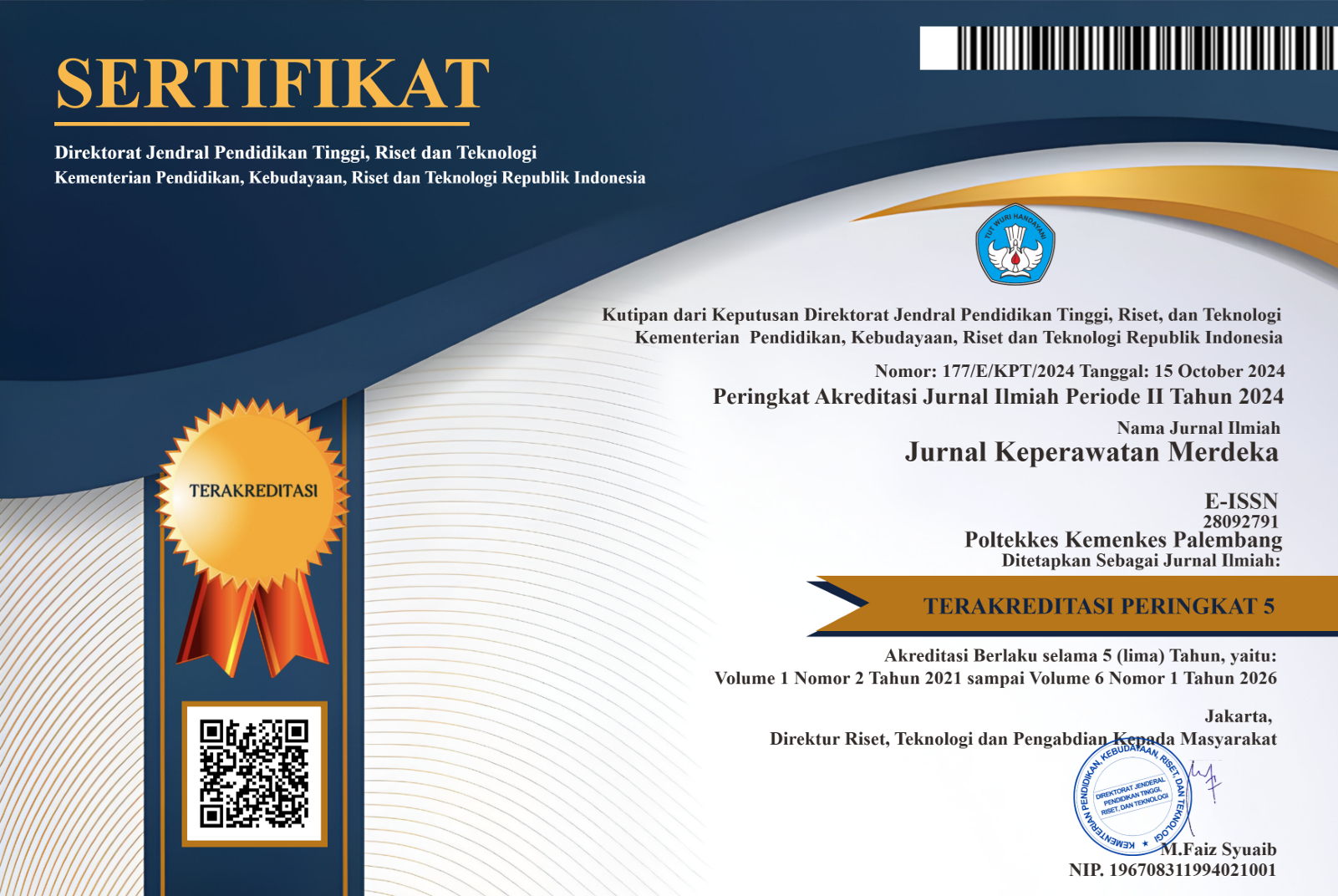Implementasi Keperawatan Terapi Musik Pada Pasien Hemodialisa Dengan Masalah Keperawatan Ansietas
Abstract
Background : Hemodialysis is one of the therapies for patients with kidney failure to remove metabolic waste and excess body fluid by circulating blood into a device that consists of two compartments: blood and a dialyzer, to eliminate the metabolic waste and excess fluid. The repetitive hemodialysis process over an extended period can cause anxiety in patients. Method: This study utilizes a descriptive research design with a case study approach involving the nursing process. The case study subjects are two patients with kidney failure undergoing hemodialysis who are experiencing anxiety. Music therapy was administered three times during each hemodialysis session, with intervals based on the patients' preferences, over the course of three consecutive days. Case study techniques included conducting interviews/anamnesis, observations, and physical examinations. The instrument used to measure anxiety was the Hamilton Anxiety Rating Scale (HARS) questionnaire. Results: After the implementation of music therapy on both case study subjects, there was a decrease in anxiety levels. In subject 1, the initial measurement of anxiety was in the moderate category (HARS 24), and after the music therapy intervention, the anxiety level decreased to the mild category (HARS 16). In subject 2, the initial measurement of anxiety was also in the moderate category (HARS 26), and after the music therapy intervention, the anxiety level decreased to the mild category (HARS 18). Conclusion: The implementation of nursing music therapy can help reduce anxiety levels in hemodialysis patients
References
Agarwal, R., & Light, R. P. (2010). Intradialytic hypertension is a marker of volume excess. Nephrology Dialysis Transplantation, 25(10), 3355–3361. https://doi.org/10.1093/ndt/gfq210
AMTA. (2015). Music Therapy : A Continuum of Growth Preliminary Program. 1–67.
Bacchetta, J., Pelletier, S., Vilayphiou, N., Boutroy, S., Sornay-Rendu, E., Szulc, P., Arkouche, W., Guebre-Egziabher, F., Fouque, D., & Chapurlat, R. (2012). Bone microarchitecture is more severely affected in patients on hemodialysis than in those receiving peritoneal dialysis. Kidney International, 82(5), 581–588. https://doi.org/10.1038/ki.2012.166
Bargman, J. M., & Skorecki, K. (2010). Penyakit Ginjal Kronik. Harrison’s Principles of Internal Medicine.
Delima, D., & Tjitra, E. (2017). Faktor Risiko Penyakit Ginjal Kronik : Studi Kasus Kontrol di Empat Rumah Sakit di Jakarta Tahun 2014. Buletin Penelitian Kesehatan, 45(1), 17–26. https://doi.org/10.22435/bpk.v45i1.7328.17-26
Dewi, B. P., Darussalam, A. A., Rimbawati, Y., & Wulan, S. (2022). Volume 9. Nomor 2. Juli 2022. 9.
Djohan (Ed.). (2006). Terapi Musik, Teori dan Aplikasi. Perpustakaan Nasional RI : Katalog dalam terbitan (KDT). https://books.google.co.id/books?id=pA7tnbFTNrwC&lpg=PP1&hl=id&pg=PP1#v=onepage&q&f=false
Handayani, R., Ekiwarti, Budiarti, I. S., Wijaya, O. A., Novera, M., & Asman, A. (2022). Studi Kasus : Terapi Musik Klasik Untuk Menurunkan Kecemasan Pada Pasien Gagal Ginjal Kronik. 1(1), 41–53.
Himmelfarb, J., & Ikizler, T. A. (2003). Hemodialysis. International Review of Applied Economics, 17(1), 121–124. https://doi.org/10.1080/714891067
Indonesian, P., Registry, R., Renal, I., Indonesia, P. N., Kesehatan, D., Kesehatan, D., Nasional, J. K., Indonesian, K., Registry, R., Irr, A. M., Registry, I. R., Ginjal, T., Memacu, P., Irr, P., Course, H., & Irr, L. (2017). 9 th Report Of Indonesian Renal Registry 2016. 1–46.
Indonesian Renal Registry. (2018). 11th report Of Indonesian renal registry 2018. Indonesian Renal Registry (IRR), 14–15.
J, M. L., Abraham, D. E. J., & Malarvizhi, D. G. (2017). Effectiveness of Intradialytic Stretching Exercises on Prevention and Reduction of Muscle Cramps among Patients undergoing Haemodialysis at PSG Hospitals Coimbatore. IOSR Journal of Nursing and Health Science, 06(02), 47–53. https://doi.org/10.9790/1959-0602044753
Juwita, L., & Kartika, I. R. (2019). Pengalaman Menjalani Hemodialisa Pada Pasien Gagal Ginjal Kronis. Jurnal Endurance, 4(1), 97. https://doi.org/10.22216/jen.v4i1.3707
Kemenkes RI. (2018). Hasil Riset Kesehatan Dasar Tahun 2018. Kementrian Kesehatan RI, 53(9), 1689–1699.
Kidney Disease Improving Global Outcomes. (2009). Special Issue: KDIGO Clinical Practice Guideline for the Care of Kidney Transplant Recipients. American Journal of Transplantation, 9(Suppl 3), S1–S155. https://doi.org/10.1111/j.1600-6143.2009.02834.x
Kidney International Supplements. (2013). Chapter 1: Definition and classification of CKD. Kidney International Supplements, 3(1), 19–62. https://doi.org/10.1038/kisup.2012.64
Lina, L. F., Susanti, M., A, F. N., Wahyu, H., & Efrisnal, D. (2020). Pengaruh Terapi Musik Klasik (Beethoven) Terhadap Penurunan Kecemasan Pada Pasien Yang Menjalani Hemodialisa Dengan Gagal Ginjal Kronik Di Rsud Dr. M Yunus Bengkulu the Effect of Classic Music Therapy (Beethoven) on Reducing Anxiety in Hemodialisa Patient.
Lubis, A. (2020). Pengertian dari karakteristik diagnosa dan menerapkan proses pengumpulan data sesuai dengan standar. https://doi.org/10.31219/osf.io/mg7pa
Mubarak, W. I., Indrawati, L., & Susanto, J. (2015). Buku Ajar Ilmu Keperawatan Dasar : Buku 1 (Buku 1).
Narsa, A. C., Maulidya, V., Reggina, D., Andriani, W., & Rijai, H. R. (2022). Studi Kasus: Pasien Gagal Ginjal Kronis (Stage V) dengan Edema Paru dan Ketidakseimbangan Cairan Elektrolit. Jurnal Sains Dan Kesehatan, 4(SE-1), 17–22. https://doi.org/10.25026/jsk.v4ise-1.1685
Normah, Rifai, B., Vambudi, S., & Maulana, R. (2022). Analisa Sentimen Perkembangan Vtuber Dengan Metode Support Vector Machine Berbasis SMOTE. Jurnal Teknik Komputer AMIK BSI, 8(2), 174–180. https://doi.org/10.31294/jtk.v4i2
Nurarif, Amin, H., & Hardhi, K. (2015). Aplikasi: Asuhan Keperawatan Berdasarkan Diagnosa Medis NANDA & NIC-NOC Jilid 1. Mediaction.
PPNI. (2016). Standar Diagnosis Keperawatan Indonesia : Definisi dan Indikator Diagnostik (Edisi 1). DPP PPNI.
Sari, yade kurnia. (2016). Pengaruh Terapi Musik Mozart Terhadap Ansietas Pada Pasien Hemodialisa Di RSUD DR . Achmad Mochtar Bukittinggi Tahun 2016. 9(1), 9–14.
Setiati, S., Alwi, I., Sudoyono, A. W., Setiyahadi, B., & Syam, A. F. (Eds.). (2014). Buku Ajar Ilmu Penyakit Dalam (VI). Interna Publishing.
Siregar, W. M., Tanjung, D., & Effendy, E. (2022). Efektivitas Terapi Musik Alam terhadap Tingkat Kecemasan pada Pasien Hemodialisis. Journal of Telenursing (JOTING), 4(2), 428–438. https://doi.org/10.31539/joting.v4i2.2692
Stuart, G. W. (2013). Principles and Practice of Psychiatric Nursing. In The American Journal of Nursing (Vol. 81, Issue 12). https://doi.org/10.2307/3462918
Sukandar, E. (2006). Gagal Ginjal dan Panduan Terapi Dialisis. Pusat Informasi Ilmiah Bagian Ilmu Penyakit Dalam Fakultas Kedokteran Universitas Padjajaran/RS Dr. Hasan Sadikin Bandung.
Sumah, D. F. (2020). Kecerdasan Spiritual Berkorelasi dengan Tingkat Kecemasan Pasien Gagal Ginjal Kronik yang Menjalani Hemodialisa di Ruang Hemodialisa RSUD dr. M. HAULUSSY Ambon. Jurnal Biosainstek, 2(01). https://doi.org/10.52046/biosainstek.v2i01.352
Wahyuni, A., Kartika, I. R., Asrul, I. F., & Gusti, E. (2019). Korelasi Lama Hemodialisa Dengan Fungsi Kognitif. REAL in Nursing Journal, 2(1), 1. https://doi.org/10.32883/rnj.v2i1.328
Widowati, S. R. (2011). Tingkat Kualitas Hidup Pasien Gagal Ginjal Kronik Terapi Hemodialisis. Jurnal Kesehatan Masyarakat, 6(2), 107–112.
Wijaya, A. S., & Putri, Y. M. (2013a). KMB 1; Keperawatan Medikal Bedah (Keperawatan Dewasa) (cetakan ke). Nuha Medika.
Wijaya, A. S., & Putri, Y. M. (2013b). KMB 1; Keperawatan Medikal Bedah (Keperawatan Dewasa) Teori Dan Contoh Askep. Nuha Medika.
Wijayanti, A. E. (2020). Terapi Musik pada Pasien di Ruang Hemodialisis Rumah Sakit Tentara dr. Soejono Magelang. DIMAS: Jurnal Pengabdian Masyarakat, 2(2), 108–110. https://doi.org/10.47317/dmk.v2i2.300
Wong, P. T. P. (2012). The Meaning Mindset Measurement and Implications. International Journal of Existential Psychology and Psychotherapy, 4(1), 1–3
Copyright (c) 2024 JKM : Jurnal Keperawatan Merdeka

This work is licensed under a Creative Commons Attribution-ShareAlike 4.0 International License.
Authors who publish with this journal agree to the following terms:
- Authors retain copyright and grant the journal right of first publication with the work simultaneously licensed under a Creative Commons Attribution License that allows others to share the work with an acknowledgement of the work's authorship and initial publication in this journal.
- Authors are able to enter into separate, additional contractual arrangements for the non-exclusive distribution of the journal's published version of the work (e.g., post it to an institutional repository or publish it in a book), with an acknowledgement of its initial publication in this journal.
- Authors are permitted and encouraged to post their work online (e.g., in institutional repositories or on their website) prior to and during the submission process, as it can lead to productive exchanges, as well as earlier and greater citation of published work













